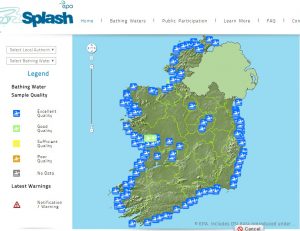With schools closed, the summer holidays in full swing and temperatures set to hit 30 degrees in some parts of the country today, now is the time to plan a trip to one of Ireland’s beautiful beaches and lakes. To help you choose where to go, the Environmental Protection Agency (EPA) provides up-to-date information on the water quality at 140 beaches and lakes nationwide on their Splash website, http://splash.epa.ie/
Using the interactive, colour-coded map, you can find out details of water quality, if a beach is dog friendly, whether first aid is available, and which beaches have lifesaving facilities. Beach profiles include a picture of the beach, visitor numbers, information about the area and details of the facilities available. You can also use the website to find out if any current warnings or bathing notices are in operation.
Peter Webster, Senior Scientist at the EPA is encouraging everyone to use Splash when planning their summer trip,
“Almost three quarters of our beaches are classified as ‘excellent’ by EU standards so we really should make use of these great natural resources on our doorsteps. We would urge anyone heading to the coast or to inland bathing sites to check out the water quality at the SPLASH website and sign up to the EPA on Twitter @EPABathingWater to receive alerts of any problems at our beaches. Water quality data and information on any bathing restrictions is displayed locally on Local Authority websites and on the beach notice boards”.
The EPA has the following advice for people planning holidays this summer:
- Use the Splash website: It will help you choose the right holiday for you and your family
- Never go swimming alone: It’s safest to swim with a friend but at the very least, always let someone know where you are going and when you will be back
- Don’t drink and swim
- Take note of warning signs: Always observe any closure, advisory, or safety hazards signs, they’re there for your safety
- Respect your surroundings: Take a ‘leave no trace’ approach to prevent and minimise harm during your next summer trip. While at the beach or outdoors, make sure to dispose of litter properly in the waste and recycling bins provided or alternatively bring your waste home and dispose of it later
- Use the “See It Say It” app to report any environmental concerns: By taking a quick photo, and adding a few details, this app makes it easier to make a complaint about issues such as dumping of litter or other environmental problems
- Know the warning flags: Never swim where a sign says not to or when the red flag is flying. The red flag is flown when there is a water safety risk e.g. the presence of dangerous under-currents.
- Water quality can deteriorate quite quickly after very heavy rainfall, especially at beaches near urban areas, and the red flag can also be flown where pollution is likely or where there is an increased risk of illness if you go into the water.
- Avoid harm from sun exposure: Apply sunscreen with a high SPF to reduce the intensity of the sun rays. Apply sunscreen -15-20 minutes before sun exposure. Limit exposure especially between the hours of 10am and 2pm as UV rays are strongest at these times, especially during the summer.
During the summer period local authorities accept public submissions for the identification of new bathing areas. Information is generally available from their websites under ‘Water’ or ‘Environment’. To help the public in this task the EPA have recently launched a document entitled “Public Advice on the Identification of new Bathing Waters”. The document is available from the EPA website www.epa.ie
Notes
The EPA’s 2015 Bathing Water Quality report showed that 93% of Irish bathing waters meet the EU minimum standards for water quality with 101 of the 140 bathing waters rated as being of ‘excellent’ quality. The full report is available at www.epa.ie
The majority of Irish beaches generally have few pollution problems but any possible pollution events or warnings are reported to SPLASH (splash.epa.ie).
